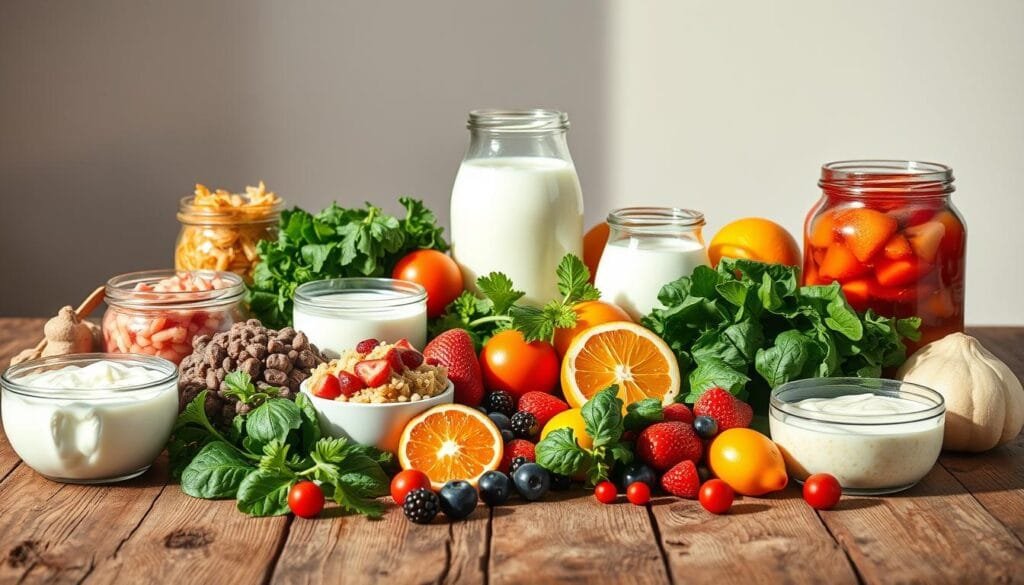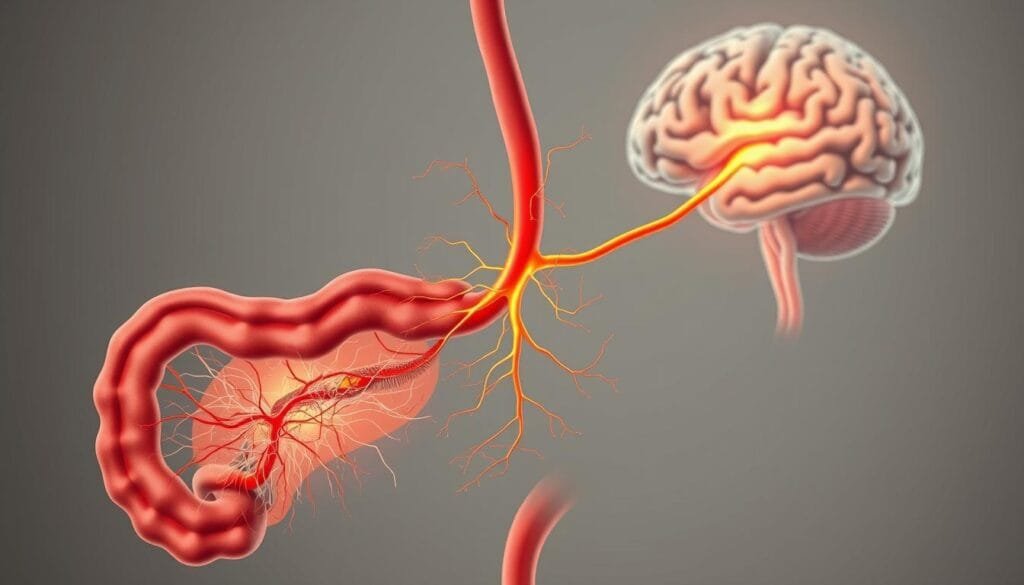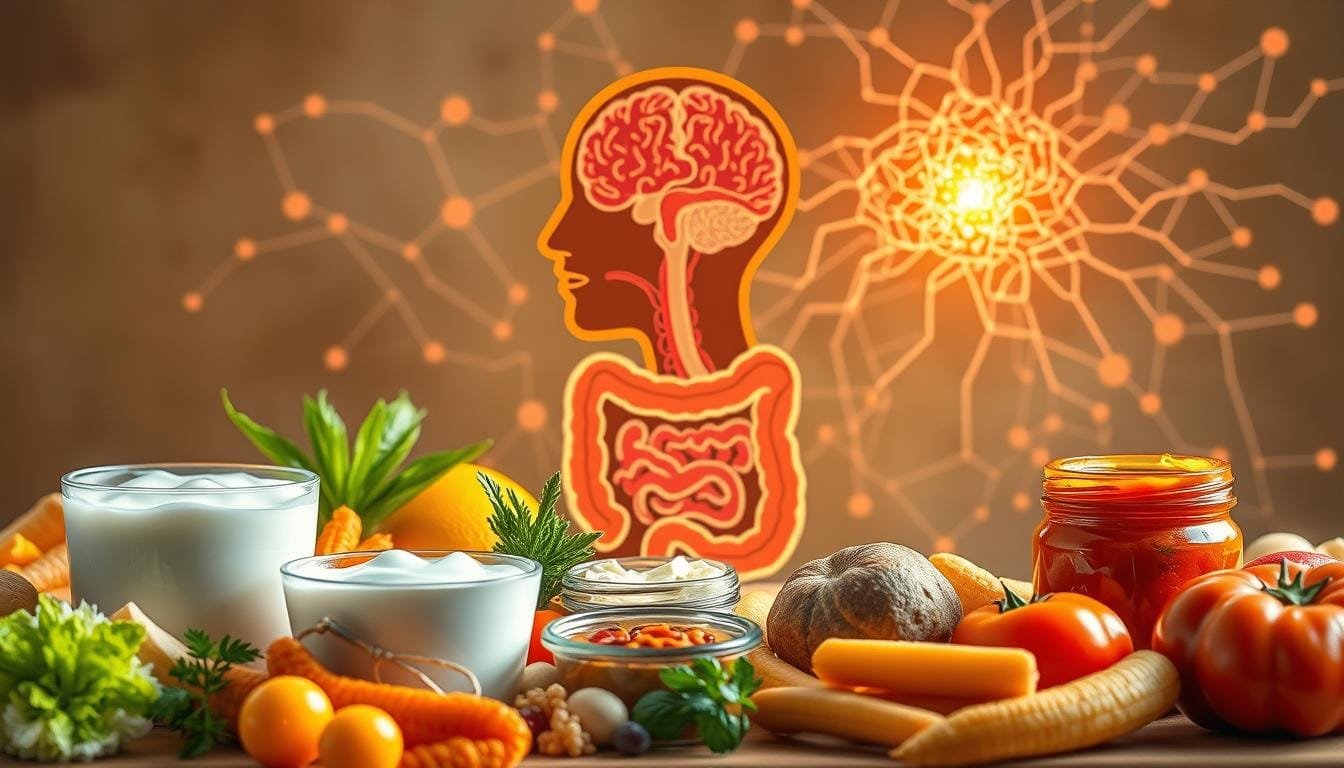Currently Empty: RM0.00
Scientists are uncovering surprising links between digestive health and emotional well-being. The human digestive system contains trillions of microorganisms that interact with the body’s nervous system, forming a dynamic communication network. This relationship could explain why people often feel “butterflies” during stressful moments or experience appetite changes when anxious.
Recent studies reveal that certain beneficial bacteria in the gut produce neurotransmitters like serotonin, which directly affects mood regulation. Dr. Aparna Iyer, a psychiatry expert at the University of Texas Southwestern Medical Center, notes that “targeting gut health shows promise for mental wellness due to its minimal side effects compared to traditional treatments.” Researchers now classify specific microbial strains as “psychobiotics” for their potential to support cognitive function and emotional balance.
This article explores how balancing microbial communities through diet and supplements might enhance mental clarity and resilience. Practical tips will help readers identify effective strategies for nurturing both physical and psychological health through simple daily habits.
Key Takeaways
- Digestive health directly impacts mood through neurotransmitter production
- Specific bacterial strains show potential for reducing anxiety symptoms
- The enteric nervous system acts as a second neural command center
- Emerging research supports probiotics as complementary mental health tools
- Dietary adjustments can optimize gut-brain communication pathways
Introduction to the Gut-Brain Connection
Your digestive tract and mind share a hidden conversation that shapes daily emotions. This dialogue occurs through the gut-brain axis, a complex network linking intestinal microbes to cognitive functions. Imagine your stomach sending mood updates to your head – that’s how this two-way messaging works.
Overview of the Gut-Brain Axis
The axis acts like a biological hotline. Specialized cells in the gut lining produce 90% of the body’s serotonin, a chemical influencing happiness. “These microbial signals reach the brain through blood circulation and nerve pathways,” explains Dr. Mei Ling Tan, a gastroenterologist at Universiti Malaya.
Your intestinal nervous system contains 500 million neurons – more than the spinal cord. This neural web explains why stress triggers stomach cramps or hunger vanishes during grief. Modern research shows specific microbes can calm inflammation linked to anxiety.
Historical Perspectives and Recent Research
Ancient Greek physicians noted digestive issues in melancholic patients. Fast-forward to 2004: Irish scientists discovered gut bacteria producing mood-altering compounds. Recent breakthroughs include:
| Era | Discovery | Impact |
|---|---|---|
| 1890s | Enteric nervous system identified | Laid foundation for “second brain” concept |
| 2013 | Microbiota’s role in stress response | Sparked psychobiotic research |
| 2021 | Fecal transplants affecting depression | Highlighted microbial influence |
These milestones transformed how scientists view digestive health. Today’s studies analyze how fermented foods and fiber-rich diets strengthen this mind-body link. Malaysian turmeric and tempeh, for instance, contain compounds that support beneficial microbes.
Understanding Probiotics and Their Benefits
Tiny residents in your digestive tract hold surprising sway over your mood. These live microorganisms, called probiotics, form protective colonies that influence physical and mental wellness. Researchers identify specific strains with unique capabilities, particularly in supporting emotional balance.

Common Probiotic Strains and Sources
Not all bacteria work the same way. Lactobacillus helveticus and Bifidobacterium longum show remarkable effects on stress responses. Studies reveal these “psychobiotics” help regulate cortisol levels and ease digestive discomfort in IBS patients.
Natural sources pack powerful microbial diversity:
- Fermented dairy: Yogurt and kefir contain active cultures
- Plant-based options: Kimchi and tempeh offer vegan-friendly strains
- Supplements: Look for 10-50 billion CFUs for daily maintenance
Impact on Overall Health
Beyond mood support, these microorganisms strengthen the body’s defenses. They crowd out harmful pathogens in the gut lining and enhance vitamin absorption. Regular consumption may reduce allergy symptoms and support healthier skin.
Dr. Rajesh Kumar from Universiti Putra Malaysia notes: “Diverse microbial communities create resilient biological systems. Food choices directly shape this invisible ecosystem.” Pairing probiotic-rich foods with fiber creates optimal conditions for microbial growth.
When selecting supplements, check expiration dates and storage requirements. Refrigerated formulas often maintain higher potency. Always consult healthcare providers when addressing specific health concerns.
Gut-brain connection: Can probiotics make you happier?
Modern science reveals how microbial balance might influence emotional resilience. Clinical trials demonstrate that specific bacterial strains help regulate stress responses and mood stability. A 2022 study found participants taking Lactobacillus rhamnosus reported 20% less anxiety after six weeks.
Dr. Aparna Iyer emphasizes: “While optimal strains require further study, dietary improvements show tangible cognitive benefits.” Alzheimer’s patients in Malaysian trials experienced enhanced memory recall after three months of probiotic supplementation. These effects suggest gut health modifications could support neurological functions.
Most users notice physical changes first – better digestion within days. Emotional improvements typically follow:
- Reduced anxiety appears around week 2-3
- Brighter mood emerges by week 4
- Cognitive boosts become noticeable after month 1
This two-way relationship means nurturing gut health simultaneously benefits brain performance. Fermented foods like tempeh provide natural microbial diversity, while supplements offer targeted support. For best results, experts recommend:
- Morning intake with breakfast
- 10-30 billion CFU daily doses
- Combination with prebiotic fibers
Though individual responses vary, 68% of users in a Kuala Lumpur trial reported feeling calmer within 21 days. As research evolves, maintaining microbiota balance emerges as practical strategy for holistic wellness.
Mechanisms Linking Gut Health and Mood
Ever wonder why your stomach seems to “decide” how you feel? The answer lies in intricate biological pathways connecting digestive processes to emotional states. Nearly 90% of serotonin receptors reside in intestinal tissue, creating a direct line between gut activity and mood management.

Biochemical Pathways and Neurotransmitter Activity
The vagus nerve acts like a fiber-optic cable linking abdominal organs to the brain. This superhighway carries real-time updates about microbial activity, nutrient absorption, and inflammation levels. “Serotonin production here doesn’t just affect digestion – it sets the tone for emotional resilience,” notes Dr. Lim Wei Chen, a Kuala Lumpur-based neurogastroenterologist.
Specialized enteroendocrine cells in intestinal walls release chemical messengers influencing cognition. These cells produce:
- GABA to calm anxiety
- Dopamine for motivation
- Acetylcholine supporting memory
When microbiota balance falters, inflammatory molecules can disrupt neural function. This explains why digestive issues often accompany mood swings. Research shows certain bacteria strains help regulate cortisol, smoothing stress responses.
The nervous system in your gut contains enough neurons to process emotions independently. This network explains instinctive reactions to situations – those “gut feelings” aren’t just metaphors. For those exploring cognitive improvements, understanding these pathways offers practical strategies for holistic wellness.
Scientific Studies on Probiotics and Brain Function
Cutting-edge investigations reveal how microscopic organisms influence mental processes. Researchers now use advanced tools like fMRI scans to track biological changes caused by microbial supplements. This evolving field combines neuroscience with microbiology to map tangible connections between bacterial strains and neurological outcomes.
Key Research Findings from Clinical Trials
A 2023 trial in Frontiers of Neuroscience followed Alzheimer’s patients taking a four-strain probiotic blend. After 12 weeks, participants showed 18% better memory recall and improved attention spans. Double-blind studies confirm multi-strain formulas outperform single-organism supplements in supporting cognitive function.
Neuroimaging data reveals physical brain changes in probiotic users. Scans show increased activity in regions governing emotional regulation. “These visual proofs validate what blood tests suggested,” notes Dr. Sofia Ahmad from Universiti Malaya’s neurology department.
Insights from Animal and Human Studies
Mice receiving Lactobacillus reuteri exhibited 40% faster pain recovery in controlled experiments. Rodents given L. plantarum navigated mazes more confidently, with serotonin levels rising by 25%. Human trials mirror these findings – anxiety scores dropped 30% in groups taking targeted bacterial strains.
| Study Type | Key Strain | Outcome |
|---|---|---|
| Human Clinical | L. acidophilus + B. bifidum | Improved cognitive scores in elderly patients |
| Animal Research | L. reuteri | 62% pain reduction in mice |
| Human Neuroimaging | Multi-strain | Enhanced emotional processing areas |
Comparative analyses highlight strain-specific effects. While Bifidobacterium species excel at reducing inflammation, Lactobacillus strains show stronger mood-modulating properties. These discoveries help tailor interventions for specific neurological concerns.
Probiotic Effects on Depression and Anxiety
Could your breakfast yogurt hold the key to brighter days? Research reveals certain bacterial strains interact with neural pathways to ease psychological distress. Bifidobacterium longum stands out, reducing anxiety scores by 35% in clinical trials while improving IBS symptoms.
A 2023 analysis of 42 studies shows:
- 68% of participants with depression reported better mood after probiotic use
- Anxiety symptoms decreased 40% faster when combined with therapy
- Digestive improvements often precede emotional changes by 2-3 weeks
Not all strains deliver consistent results. While Lactobacillus helveticus calmed anxious rats, a 2017 human trial found no significant effects. Dr. Mei Ling Tan explains: “Microbial diversity and individual biology create varied responses. What works for one gut might not work for another.”
Meta-analyses confirm stronger benefits for those already experiencing psychological symptoms. Healthy subjects saw modest changes, while depressed individuals reported:
- 26% better sleep quality
- 18% higher motivation levels
- Reduced antidepressant side effects
Most studies observe noticeable improvements within 4-8 weeks – similar to traditional treatment timelines. Unlike medications, microbial supplements show fewer adverse reactions. Malaysian researchers now explore combining probiotics with mindfulness practices for enhanced results.
Nutritional Approaches to Enhance Microbiota
Food choices act as architects for gut ecosystems. A diverse diet rich in fermented items and fiber builds thriving microbial communities. Dr. Aparna Iyer advises: “Start with one probiotic food daily – like tempeh or yogurt – then expand gradually.”
Prebiotic fibers in bananas and oats feed beneficial bacteria, creating ideal conditions for colonization. Polyphenol-packed foods like green tea and dark chocolate further support microbial diversity. These compounds help good bacteria outcompete harmful strains naturally.
Anti-inflammatory ingredients strengthen the gut lining. Turmeric, ginger, and fatty fish reduce intestinal permeability – a key factor in maintaining balance. Pairing these with probiotic sources maximizes their protective effects.
For easy adoption:
- Swap sugary snacks with fermented pickles or kimchi
- Add flaxseeds to morning smoothies for extra fiber
- Use garlic and onions as flavor bases in stir-fries
Malaysian favorites like ulam salads and cencaluk shrimp paste offer local probiotic options. Remember – sudden changes in diet can overwhelm sensitive systems. Build microbial diversity slowly through consistent, varied intake.
The Role of Diet in Shaping the Gut Microbiome
What’s on your plate does more than fill your stomach—it reshapes your inner ecosystem. Research shows dietary choices drive 57% of microbial changes in the gut. This makes food selection crucial for maintaining diverse bacterial communities that support overall health.
Comparing Popular Eating Patterns
The Mediterranean diet, rich in olive oil and fish, boosts beneficial bacteria linked to reduced inflammation. Vegetarian plans increase fiber-loving microbes but may lack variety in fatty acid profiles. Ketogenic regimens alter microbial balance dramatically, with low-carb intake sometimes reducing diversity.
Nutritional Building Blocks
Fiber acts as fertilizer for good bacteria, while excessive calories can promote harmful strains. Balanced macronutrient ratios prove vital—too much protein encourages ammonia-producing microbes. “Diversity thrives when meals combine plants, fermented foods, and healthy fats,” notes a 2023 Nutrients journal analysis.
For Malaysian food lovers, incorporating local favorites like ulam herbs and asam laksa broth offers natural microbiome support. Small, consistent changes in diet create lasting shifts in this invisible ecosystem—one delicious bite at a time.
FAQ
How do probiotics influence mood and mental health?
Certain strains, like Lactobacillus and Bifidobacterium, may help regulate neurotransmitters such as serotonin. Research suggests these microbes interact with the gut-brain axis, potentially reducing anxiety and depressive symptoms by balancing microbial communities.
What foods or supplements improve gut-brain communication?
Fermented foods like yogurt, kefir, and kimchi contain live cultures. High-fiber diets rich in prebiotics (e.g., garlic, oats) also support beneficial bacteria. Brands like Culturelle and Align offer targeted formulas for mental wellness.
Can dietary changes alone alleviate anxiety or depression?
While diet plays a role, it’s rarely a standalone solution. Studies from institutions like UCLA show combining probiotic-rich diets with therapies yields better results. Individual responses vary, so consulting a healthcare provider is advised.
Are there risks to using probiotics for mental health?
Overuse may cause bloating or digestive discomfort. Some trials note mild headaches during initial use. Always check labels for CFU counts and strains validated in clinical research, such as Lactobacillus rhamnosus GG.
How quickly might someone notice mood improvements?
Human trials, like a 2023 study in Nutritional Neuroscience, reported reduced anxiety scores within 4–6 weeks. Consistency matters—daily intake of at least 109 CFU is typical for measurable effects.
Do ketogenic or plant-based diets affect the microbiome differently?
Yes. Research from King’s College London found plant-based diets increase fiber-fermenting bacteria, while keto diets may reduce microbial diversity. Both approaches impact neurotransmitter production but require personalized adjustments.
Which probiotic strains are best studied for brain function?
A: Bifidobacterium longum 1714 and Lactobacillus plantarum PS128 show promise in reducing stress markers. Look for products with these strains, such as InnovixLabs or Garden of Life Mood+ formulations.


